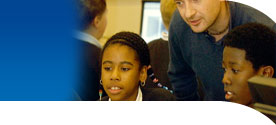



The mathematics programme of study provides a context for developing pupils' personal, learning and thinking skills (PLTS).
The programme of study requires pupils to work on open and closed tasks in a variety of contexts that allow them to select the mathematics to use. The key concept of competence requires pupils to process and evaluate information, applying mathematics to familiar and unfamiliar contexts. Pupils plan what to do, selecting which methods, tools and models to use to represent a situation or problem.
The key concept of creativity requires pupils to pose questions and use existing mathematical knowledge in novel contexts. Pupils should explore the effects of varying values of parameters or variables and make connections within mathematics when analysing a situation. They will be expected to try different ways to tackle a problem by using the same mathematics in increasingly difficult or unfamiliar contexts.
The mathematics programme of study should provide opportunities for pupils to work collaboratively as well as independently to solve mathematical problems in a range of contexts. Understanding about the history of mathematics and the mathematics of different cultures encourages and supports pupils to listen to, and be sensitive to, different views and broadens their perspective on the subject.
Pupils will be expected to work independently on extended tasks that bring together different aspects of mathematical content, involving using several of the key processes or the handling data cycle. They will make decisions autonomously while working towards goals, showing initiative, confidence, commitment and perseverance.
Pupils' use of mathematical ideas and models to explore issues or problems is mediated through the key concept of critical understanding. When interpreting and evaluating, pupils should be able to develop convincing arguments to influence others and take part in discussion. Working on problems that arise in other subjects and outside school helps pupils understand how mathematics is relevant in all areas of life.
Pupils will be expected to evaluate their own and others' work and respond constructively. The key process of analysing requires them to work logically towards results and solutions, and to value feedback and learn from mistakes.
With thoughtful planning, a range of PLTS can be embedded in any sequence of work. For example, pupils might be asked to investigate and compare different ways of upgrading and paying for a new mobile phone over several lessons. This would involve pupils: